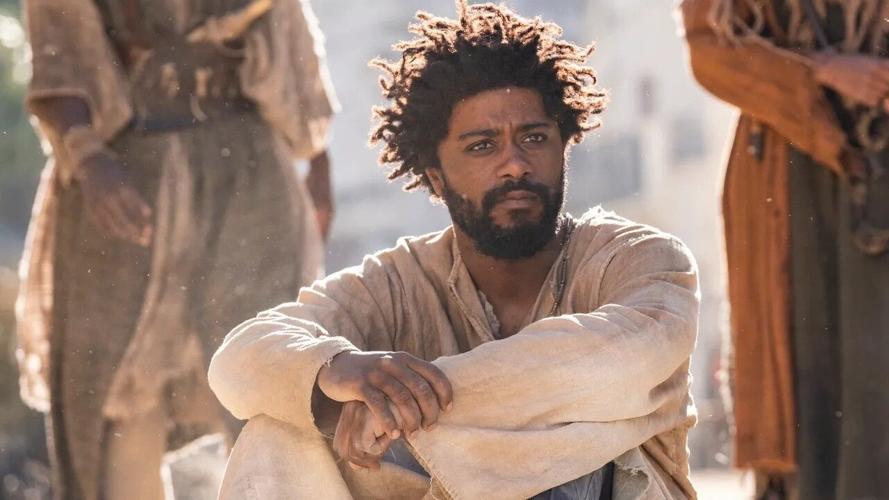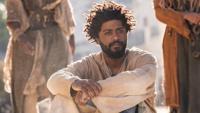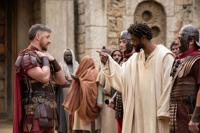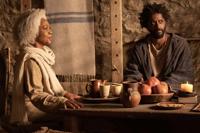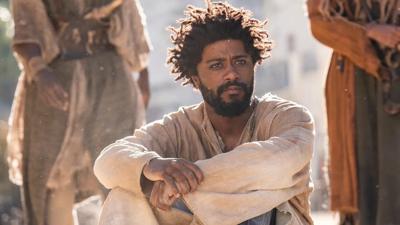This is the second feature from Jeymes Samuel. It follows his western The Harder They Fall (2019). He's tackling another genre, that of Biblical epics like The Ten Commandments (1956) and Ben-Hur (1959). Yet, as the film opens, it's clear that Samuel's tone is satirical or comedic. In fact, it felt as if this film were going to spoof those kinds of Biblical epics, in the vein of Monty Python's Life of Brian (1979) or History of the World, Part I (1981). Instead, it's not. By the end, Samuel's film veers into territory that's more akin to the kind of faith-based cinema from the likes of Affirm Films and Pure Flix.
LaKeith Stanfield (The Harder They Fall and Judas and the Black Messiah) stars as Clarence, a Black man living in Judea in 33 A.D., which is presumed to be the year that of Jesus of Nazareth was crucified at the hands of the Roman government. Clarence is the twin brother to Thomas the Apostle, one of the Twelve Disciples who were the primary followers of Jesus and the ones who initially spread the Gospel. Thomas was the one who doubted Jesus' resurrection and thus him being the son of God. This film transfers that skepticism to the character of Clarence. Therefore, Clarence is essentially an atheist.

Samuel's narrative has Clarence come up with the idea that he's going to pretend to be a Messiah, akin to Jesus, in order to scam people out of money. As such, Samuel's narrative is a perfect vehicle to skewer a lot of the Biblical stories associated with Jesus, including how he's supposed to look. For the first half of the film, it does skewer or mock the Biblical stories. However, half-way through, the film pivots and Clarence's skepticism becomes less of a question. Jesus is flatly shown as real in terms of his powers and origins. Samuel pivots in order to start the metaphor of Black Lives Matter and somehow equate what Jesus went through to current day African Americans getting killed or abused by police. It's a metaphor that feels a little overblown and heavy-handed.
On one hand, what Samuel is doing could be akin to what Lin-Manuel Miranda did in Hamilton (2015). Miranda took a fundamental, historical story and told it using actors of color, emphasizing a current social justice issue, that of immigration. Samuel could be doing the same, except he's emphasizing the Black Lives Matter movement. The difference is that Miranda's storytelling had comedic aspects but was mostly earnestly done. Miranda's musical wasn't a spoof or had a tone that could be confused with such. Yet, Samuel's film is a spoof or at least has a tone initially that strongly suggests such. Where Miranda condensed or skipped over certain aspects, Samuel alters the story in a way that almost feels designed to mock the Jesus story, not honor it. By the end, when Samuel's narrative then veers into trying to honor the story, it feels jarring at best and disingenuous at worst.

It's almost as if he's pandering to the religious community who might be interested in this film, instead of being a true critique of Christianity's origins. It's practically a sycophant appealing to the evangelical crowd. This is not to say that doing a film that appeals to Christians or evangelicals is wrong. If Samuel wanted to do an African or Black version of Mel Gibson's The Passion of the Christ (2004), that would've been fine. If Samuel had wanted to do an African or Black version of Monty Python's Life of Brian, that would've been fine as well. Instead, Samuel wants to do something that's in between or a blending of the two, and it didn't land for me.
Rated PG-13 for strong violence, drug use, language, suggestive material and smoking.
Running Time: 2 hrs. and 9 mins.
In theaters.



